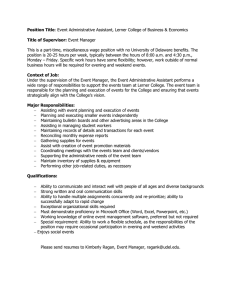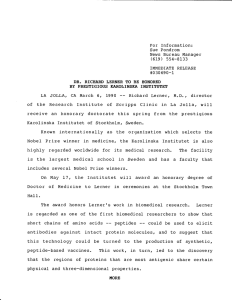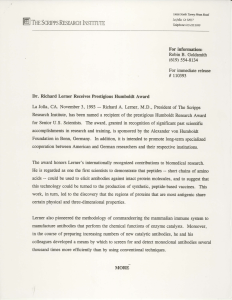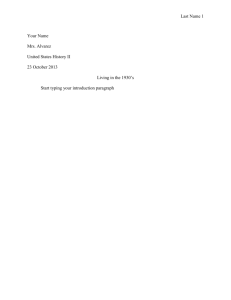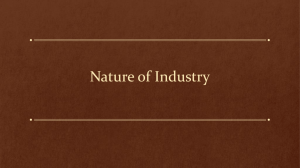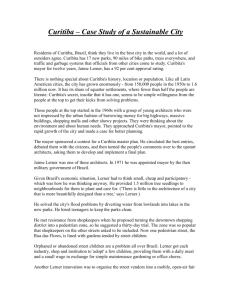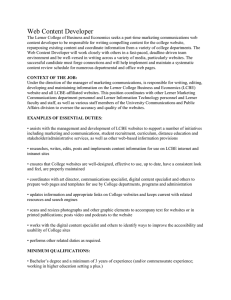May 17, 2009
advertisement
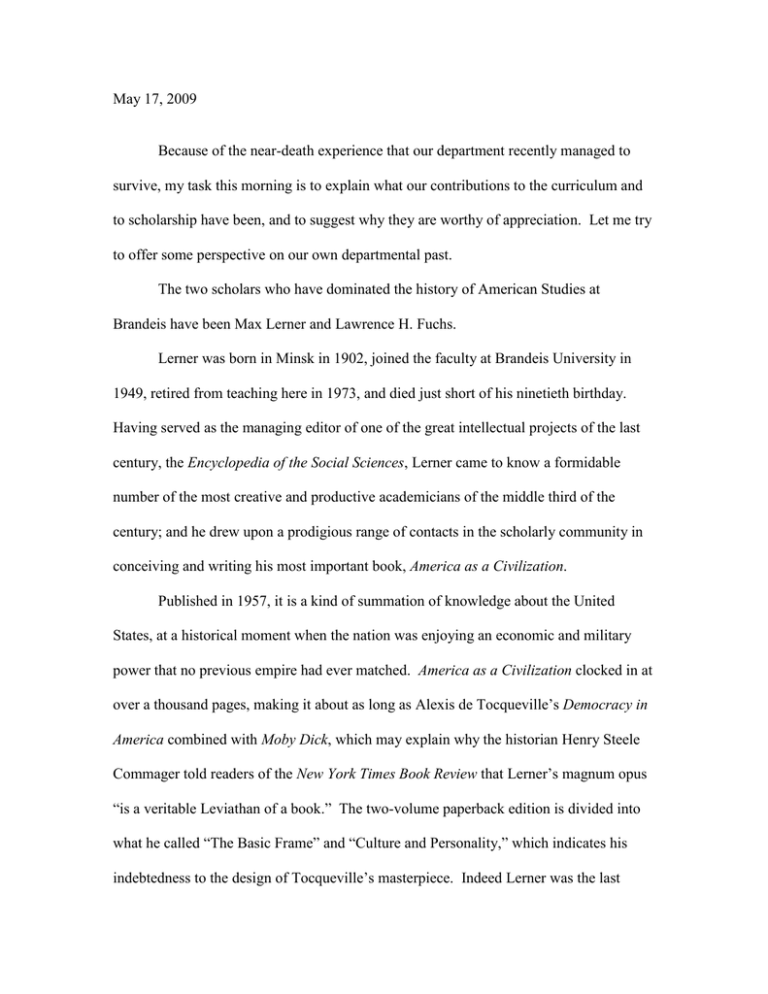
May 17, 2009 Because of the near-death experience that our department recently managed to survive, my task this morning is to explain what our contributions to the curriculum and to scholarship have been, and to suggest why they are worthy of appreciation. Let me try to offer some perspective on our own departmental past. The two scholars who have dominated the history of American Studies at Brandeis have been Max Lerner and Lawrence H. Fuchs. Lerner was born in Minsk in 1902, joined the faculty at Brandeis University in 1949, retired from teaching here in 1973, and died just short of his ninetieth birthday. Having served as the managing editor of one of the great intellectual projects of the last century, the Encyclopedia of the Social Sciences, Lerner came to know a formidable number of the most creative and productive academicians of the middle third of the century; and he drew upon a prodigious range of contacts in the scholarly community in conceiving and writing his most important book, America as a Civilization. Published in 1957, it is a kind of summation of knowledge about the United States, at a historical moment when the nation was enjoying an economic and military power that no previous empire had ever matched. America as a Civilization clocked in at over a thousand pages, making it about as long as Alexis de Tocqueville’s Democracy in America combined with Moby Dick, which may explain why the historian Henry Steele Commager told readers of the New York Times Book Review that Lerner’s magnum opus “is a veritable Leviathan of a book.” The two-volume paperback edition is divided into what he called “The Basic Frame” and “Culture and Personality,” which indicates his indebtedness to the design of Tocqueville’s masterpiece. Indeed Lerner was the last 2 specialist in American Studies who had the audacity to believe that a single intelligence could grasp the magnitude and complexity of the nation’s past and present. He showed a flair for the exposition of ideas, and had written brilliantly on a number of intellectuals, especially Professor Thorstein Veblen and Justice Oliver Wendell Holmes. By contrast Lerner’s short book on Tocqueville is disappointingly weak, perhaps because by 1966 so much unraveling had occurred that the sense of American civilization as a discrete unit could no longer be effectively defended. Lerner’s course on this topic was required of all Brandeis sophomores. In 1957, the year that his book appeared, one of those sophomores was about to help shape the Sixties, the decade characterized by the decomposition of a coherent American culture and polity. That sophomore would have been Abbie Hoffman ’59, about whom, incidentally, one of our graduating seniors this morning, Jeremy Botwinick, has rather insightfully written. Lerner’s book appeared in the late fall, which was bad timing, because Sputnik had been launched less than three months earlier. The Soviet achievement in outer space made even America’s technological supremacy open to serious doubt, and thus undermined the aura of complacency and confidence that hovers over America as a Civilization. Its weakness is its static quality; and even though Lerner would come to see his adopted land as an “unfinished country” and later as “a wounded civilization,” he could not help, as Time Magazine said of him in 1960, having “a crush on America.” When I joined the Department of American Studies, I had an occasional lunch with him. Because of my awareness that he had known just about everyone, from President Franklin D. Roosevelt to Justice Felix Frankfurter to Professor Harold Laski, I 3 expected a name-dropper, perhaps a bit like the financier Bernard Baruch, whose significant career in public service had begun by chairing the War Industries Board during the First World War, and who in his retirement was heard to reminisce as follows: “I remember telling Woodrow, with Oliver Wendell standing right there, that, next to Winston, Franklin is the young man to watch.” But Lerner wasn’t like that at all, and in our conversations I was struck by his unpretentiousness and his openness. I also knew him to be something of an ideologue of sex; he offered a popular course in our Department entitled “Eros in America.” In our plaid, plain academic lives, Lerner added color because of his affair with Elizabeth Taylor, who had been tagged as “the world’s most beautiful woman.” Indeed, at what may have been my first departmental meeting, I proposed to offer a new course that would emphasize the thematic similarities in the ways that Americans recounted their own lives, from Benjamin Franklin through Booker T. Washington down to Malcolm X. My new colleague Jerry Cohen warned me, however, that Max was already teaching a course on “Autobiography in America,” but under the title of “Eros in America.” Lerner had a gift for inspiring loyalty from younger colleagues, including the second pivotal figure in the history of the Department. Indeed it was created, though not ex nihilo, in 1970, by Lawrence Fuchs, who came to Brandeis in 1952 and served the longest stint as our chairperson until his retirement half a century later. Like Lerner, Fuchs had deepened his academic understanding of America by political engagement, though through public service rather than through journalism. He served as the first director of the Peace Corps in the Philippines, with the rank of ambassador, and then twice as executive director of commissions formed to revise immigration and refugee 4 policy. Having co-taught a celebrated course at Brandeis with Eleanor Roosevelt, he too seemed to know everyone--at least in politics. After President Jimmy Carter picked Fuchs to serve as executive director of the commission assigned to recommend immigration reform, he had felt compelled to fire a staffer, who promptly sued him for employment discrimination. No one who knows Larry Fuchs could have imagined any likelihood whatsoever of such discrimination. But just to be sure, Larry alerted the disgruntled ex-staffer that, were the case to come to trial, three character witnesses would be called who could testify to his reputation in the community. The three were the two U. S. Senators from Massachusetts (Ted Kennedy and John Kerry) as well as the nation’s chief law enforcement officer, Attorney General Griffin Bell. No extra credit for guessing who won the case. Fuchs had been a speech-writer and strategist for Senator and then President John F. Kennedy, and wrote a classic, first book about the voting patterns among American Jews. A sequel covered the political profile of Roman Catholics, and Fuchs confirmed the persistence of ethnicity and religion as factors that determined how ballots are cast. He thus had something to do with scuttling the emphasis upon national unity that marked the early Cold War era, when difference could easily be interpreted as divisiveness. The Sixties that Kennedy’s election inaugurated would ensure that heterogeneity would replace homogeneity as the key component of “the civic culture,” a phrase that Fuchs apparently introduced into our public discourse, just as he is credited with being the first or almost the very first author to refer in print to white Anglo-Saxon Protestants as “WASP’s.” Since 1960 the weakened hegemony of the WASP’s is perhaps the most striking feature of the American experiment in self-government. Only a minority of the 5 current members of the U. S. Supreme Court are even Protestants, much less white Protestants. These changes were traced in Fuchs’s most important work, The American Kaleidoscope, which appeared in 1990 and won the John Hope Franklin Prize of the American Studies Association for the best book in our field that year. The American Kaleidoscope has exerted so much impact that it has even been translated into Turkish. When People Magazine did a story on Fuchs, he was photographed while contemplating the deserted hall of Ellis Island, as though he incarnated the promise of hospitality that the republic has offered to all those immigrants who yearned to breathe free. The editorial decision of People Magazine was apt. No scholar in the entire history of this university did more to make the ideal of diversity idiomatic. The American Kaleidoscope showed how various races and other ancestral groups have gotten absorbed into the civic culture. They have done so without entirely betraying their own cultural and ethnic origins and without enfeebling the fundamental institutions that the Framers had created two centuries earlier. With scholarly rigor and political passion, Fuchs demonstrated how so much of the rest of the world, in coming to America, changed it. But that great theme leaves unanswered the question of how this country changed the rest of the world; and if there is a way to foresee the next phase in the evolution of our interdisciplinary discipline of American Studies, it is to examine the profound impact that the nation has exerted outside its own borders. This mini-commencement ceremony is not the forum even to sketch out how such a study might proceed, but let me offer two illustrations--both taken from episodes in Japan. 6 When the Alvin Ailey American Dance Theatre performed there, the program ended one evening--as it so often did--with the company’s signature work, “Revelations,” a sublime tribute to the Southern black church which had helped shaped the sensibility of the choreographer himself. The response to “Revelations” that evening was overwhelming; indeed the very walls seemed to be shaking. That was certainly not an unusual experience for Ailey’s dancers. They were told only afterwards, however, that an earthquake had occurred; they hadn’t noticed anything special amid the rumbling. Several years earlier the singer and actor Harry Belafonte, who would receive an honorary degree from Brandeis in 1991, visited Japan. There, he later claimed, he had the single most memorable experience of his career on the concert stage. Upon singing the opening bars of one of his standards, “Hava Negila,” Belafonte was stunned to realize that six thousand Japanese fans were singing it along with him. Such familiarity with a Hebrew folk song that had emerged in Palestine about a century ago, which a black American calypso singer of Jamaican origins helped to inject into the world’s first truly global culture, hints at the paradoxes that punctuate our civilization. It is a culture that we hope that the students who are about to graduate from our Department will continue to find fascinating, and continue to explore, and maybe even to enrich as well. Stephen J. Whitfield
